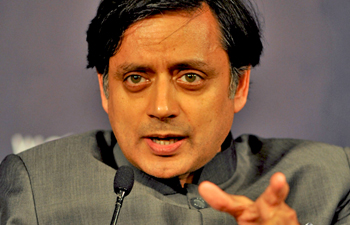 Mumbai, Aug 15: Congress leader Shashi Tharoor has attacked the BJP-led government at the Centre over the alleged "systematic increase" in cases of communal violence since the party came to power and accused it of using Hinduism as a badge of political identity to fit their "political agenda".
Mumbai, Aug 15: Congress leader Shashi Tharoor has attacked the BJP-led government at the Centre over the alleged "systematic increase" in cases of communal violence since the party came to power and accused it of using Hinduism as a badge of political identity to fit their "political agenda".
"The communal violence debate in Parliament from the last couple of days was a serious attempt by my party to highlight the fact that in last 11 weeks since they (BJP) have come to power...we have seen a systematic increase in communal violence, an increase in polarisation of communities, particularly acute in places in UP which are going for by-elections. This is clearly a political agenda," he charged.
The Congress MP from Thiruvananthapuram was addressing students here yesterday at the student-conference of St Xavier's annual inter-college festival "Malhar".
On performance of the Narendra Modi government, the former Union Minister said it shows that there is minimum governance when it comes to protecting the "aam aadmi" (common man).
"So far judging by what has happened in the last couple of months, judging by the communal riots we have seen rising, and by the silence of the Prime Minister on some very serious and disturbing issues, it really looks like we have minimum governance when it comes to protecting the 'aam aadmi' and maximum government when it comes to consolidating power in one person's hand...That is the worry," he said.
"There is always a political agenda behind saffronisation ...It is to serve the political interest of a particular party and its fellow travellers...I have a problem with people using Hinduism as a badge of political identity. They say vote for us and we will protect you as a Hindu...They (BJP) are trying to create this polarisation," he alleged.
Tharoor also criticised the maiden budget of the NDA government and said allocating Rs 100 crore for women's security means nothing if fundamental issues are not addressed.
"You had those 100 crore sops in the budget.. You can't give a 100 crore for women's security.. There are fundamental issues and challenges of women's security since the tragic rape in Delhi a year and a half ago...We really need to see major steps not a 100 crore allocation," he said.
The story of the next five years is going to be the story of the Modi government failing to live up to the expectations that his campaigns had raised in this country. The expectations are essentially almost magical, he said.
"If you look at the last 10 years (of the UPA rule) about one per cent of the Indian population has been pulled out from below the poverty line every year. That is our achievement," he added.





Comments
Add new comment